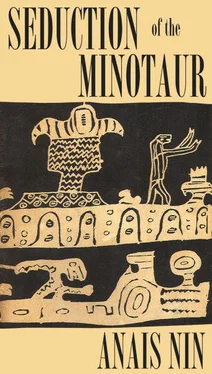The bus stopped by a wide river, beyond the village of San Luis. It was waiting for the ferry. The ferry was a flat raft made of logs tied together. Two men pushed it along with long bamboo poles. The ferry was halfway back.
An old woman in black had set up a stand of fruit juices and Coca-Cola. The bullfighter was the first one to leap out. “Are you going to visit your folks, Miguelito?”
“Yes,” he answered sullenly. He did not want to talk.
“What’s the matter, Miguelito? Usually you’re as quick with your tongue as you are with your sword!”
He too, was traveling through two cities at once. Was he still in the arena, still angry at the bull? Was he concerned about the cost of a new suit?
The raft was approaching. And on the raft was Hatcher’s jeep.
When he saw Lillian he smiled. “Were you coming to visit me? I would have come to get you.”
“I wanted a ride in the bus.”
“I’m going to pick up some bottles of water here and going right back. Where is your bag?”
“I don’t have any. I’m only free for the week end. I followed an impulse.”
“My wife will be glad to see you. She gets lonely up there.”
The bottles of water were loaded on the jeep. Then both jeep and bus rolled onto the raft.
Hatcher had hair on his fingers, like her father. Like her father he was always commanding. The raft became his raft, the men his men, the journey his responsibility. He even wanted to change its course, a course settled hundreds of years ago. His smile too was a quarter-tone smile, as if he had no time to radiate, to expand.
Already she regretted having come. This was not a journey in her solar barque. It was a night journey into the past, and the thread that had pulled her was one of accidental resemblances, familiarity, the past. She had been unable to live for three months a new life, in a new city, without being caught by an umbilical cord and brought back to the figure of her father. Hatcher was an echo from the past.
They were leaving the raft, starting their journey through the jungle. A dust road, with just enough room for the car. The cactus and the banana leaves touched their faces. When they were deep in the forest and seemingly far from all villages, they found a young man waiting for them on the road. He carried a heavy small bag, like a doctor’s bag. He wore dark glasses.
“I’m Doctor Palas,” he said. “Will you give me a ride?”
When he had settled himself beside Lillian he explained: “I just delivered a child. I’m stationed at Kulacan.”
He was carrying a French novel like the one Doctor Hernandez must have carried at his age. Was he bored and indifferent, or was he already devoted to his poor patients? She wanted to ask. He seemed to divine her question, for he said: “Last night I didn’t sleep a wink. A workman came in the middle of the night. He had a wood splinter in his eye. I tried to send him away, I hoped he would get tired of waiting, I just couldn’t wake up. But he stayed on my porch, stayed until I had to get up. Even in my sleep I heard the way he called me. They call me the way children call their mother. And I have a year of this to endure!”
Between the trees, now and then there appeared the figure of a workman with a machete. White pants, naked torso, sandals, and a straw hat, bending over their cutting. When they heard the car they straightened up and watched them with somber eyes.
Once one of them signaled Hatcher to stop. Lillian saw him grow tense. Then they pushed before them a frightened child. “Will you take him? He’s too small to walk all the way.”
“Climb over the bottles,” said Hatcher.
But the child was too frightened. He clung to the extra tire in the back, and when the jeep slowed down before a deep ravine, he leaped off and disappeared into the forest.
“Here is my place,” said Hatcher, and turned left up a hill until he reached a plateau. On this open space he had built a roof on posts, with only one wall in the back. The cooking was done out of doors. A Mexican woman was bending over her washing. She only came when Hatcher called her. She was small and heavy, and sad-faced, but she gave Hatcher a caressing look and a brilliant warm smile. Toward the visitors she showed only a conscious effort at politeness.
“You must excuse us, the place is not finished yet. My husband works alone, and has a lot to do.”
“Bring the coffee, Maria,” said Hatcher. She left them sitting around a table on the terrace, staring at an unbelievable stretch of white sand, dazzling white foam spraying a gigantic, sprawling vegetation which grew to the very edge of the sand. Birds sang deliriously, and monkeys gave humorous clown cries in the trees. The colors all seemed purer, and the whole place as if uninhabited by man.
Maria came with coffee in a thermos. Hatcher patted her shoulder and looked gratefully at her.
“She is the most marvelous wife,” he said.
“And he is a wonderful husband,” said Maria. “Mexican husbands never go around telling everyone they are married. Whenever Harry goes to Golconda, he keeps telling everyone about his wife.”
And then, turning to Lillian, she added in a lower tone, while Hatcher talked with the young doctor: “I don’t know why he loves me. I am so short and squatty. He was once married to someone like you. She was tall, and she had long, pointed, painted nails. He never talks about her. I worked for him, at first. I was his secretary. We are going to build a beautiful place here. This is only the beginning.”
Against the wall at the back they had their bedroom. Lillian could imagine them together. She was sure that he lay with his head on his wife’s breast. She was compliant, passive, devoted.
Lillian wondered if he were truly happy. He seemed so intent on affirming his happiness. He was not tranquil, nor capable of contemplation. He named all the beauties of his place, summoned them. When he mentioned America, his mouth grew bitter. He missed nothing. American women… He stopped himself, as if aware for the first timthat Lillian was one of them. His eyes alighted on Lillian’s nails. “I hate painted nails,” he said. Until now he had been friendly. Something, a shadow of a resemblance, a recall, had sent him for a moment into the city beneath the city, the subterranean chambers of memory. But he leaped back into the present to describe all the work that had yet to be done.
“As you can see, it is still very primitive.”
On the terrace, several camp beds were set side by side, as in an army barracks, with screens between them.
“I hope you won’t mind sleeping out of doors.”
The Mexican doctor was leaving. “Tomorrow I will be driving back with friends who are spending a few days in Golconda. If you want us to, we will pick you up.”
Lillian wanted to walk to the beach. She left the Hatchers discussing dinner, and followed a trail down the hill. The flowers which opened their violet red velvety faces toward her were so eloquent, they seemed about to speak. The sand did not seem like sand, but like vaporized glass, which reflected lights. The spray and the foam from the waves was of a whiteness impossible to match. The sea folded its layers around her, touched her legs, her hips, her breasts—a liquid sculptor, the warm hands of the sea all over her body.
She closed her eyes.
When she came out and put on her clothes she felt reborn, born anew. She had closed the eyes of memory. She felt as though she were one of the red flowers, that she would speak only with the texture of her skin, the tendrils of hair at the core, remain open, feel no contractions ever again.
She thought of the simplified life. Of cooking over a wood fire, of swimming every day, of sleeping out of doors in a cot without sheets with only a Mexican wool blanket. Of sandals, and freedom of the body in light dresses, hair washed by the sea and curled by the air. Unpainted nails.
Читать дальше












